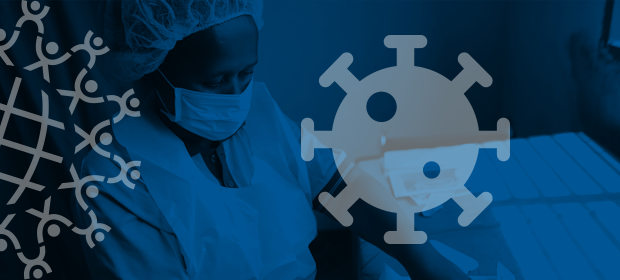Where We Work
See our interactive map


Developed and pilot tested by IntraHealth, the new District Health Information System module streamlines surveillance and COVID-19 vaccination tracking in the country.
South Sudan has experienced numerous disease outbreaks before and after its independence in 2011, which have ranged from mild to severe. The South Sudan Ministry of Health continues to face several challenges managing and providing timely responses to emerging health threats.
An underlying reason for this is the country’s shortage of health workers at the national and subnational levels. This is compounded by an untrained health workforce and a lack of data for informed decision-making. Many health workers don’t have up-to-date training and cannot provide high-quality health care while information management processes can’t provide enough data for health workers to effectively manage disease outbreaks.
Over 68% of the health workers that manage data and information at national and subnational levels are volunteers. Over 72% of the counties transmitting pandemic and health management information system (HMIS) data have limited internet connectivity and unstable power. There is also a scarcity of functional hardware (computers and accessories) at the county and facility level to support timely data collection and use.
When COVID-19 began to spread, South Sudan invested in better surveillance and vaccine systems to help manage the country's pandemic response. IntraHealth International partnered with the Ministry of Health to provide financial and technical support to deploy the new District Health Information System 2 (DHIS2) Coronavirus Disease 2019 (COVID-19) surveillance, vaccination, and Adverse Events Following Immunization (AEFI) trackers. The trackers were designed to collect COVID-19 data in the country, inform surveillance and vaccination reporting, and facilitate travel during the pandemic.
"This will streamline COVID-19 vaccine data collection and reporting."
IntraHealth developed, customized, and deployed the DHIS2 vaccination tracker for pilot testing in 16 health facilities in Juba County, in partnership with the Ministry of Health and with support from the US Centers for Disease Control and Prevention. The tracker captures individual-level vaccination data and generates electronic vaccination certificates with quick response (QR) codes. It also allows for real-time monitoring of daily vaccinations in health facilities, which helps measure COVID-19 vaccine uptake in the country.
“With the launch of this new tracker, we’re focused on highlighting the key achievements associated with the system,” says Alfred Okiria, the project director for the Strengthening National Capacity for Integrated HIV/AIDS Health Data Collection, Use, and Dissemination in Support of an Evidence-based Response in South Sudan project. “The electronic vaccination certificate is particularly helpful and has allowed South Sudanese and non-South Sudanese citizens to travel during the pandemic.”
Working with the Health Information Systems Program (HISP) Tanzania, IntraHealth trained 87 data clerks and rolled out the system at the national and subnational levels.
South Sudan now has a national surveillance system and a vaccination tracker system.
“Now that we’ve launched the DHIS2 COVID-19 tracker, we’re looking forward to integrating it into health facilities around the country,” Okiria says. “This will streamline COVID-19 vaccine data collection and reporting and provides an excellent model for other countries who are looking to roll out similar digital health tools during the pandemic.”
To design and deploy the surveillance and vaccine trackers, IntraHealth used a variety of approaches:
South Sudan now has a national surveillance system and a vaccination tracker system, which replaced the old fragmented and parallel data reporting systems for emerging outbreaks. The systems can provide real-time data for decision-making and timely responses to emerging threats. The country has built health workers’ skills in using the incidence management system to respond to emergencies. It has adopted digitalization of data management and promoted a culture of data use. And the mentorship and coaching support have created a culture of continuous learning around data management to drive evidence-based decision-making on national pandemics within the country.
Get the latest updates from the blog and eNews




